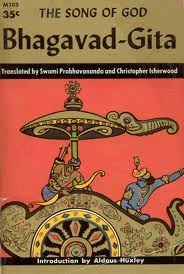
I can’t think of a better statement of the perennial philosophy than the Bhagavad Gita or Song of God
In the Bhagavad-Gita, Lord Krishna says:
Thinking about sense-objects
Will attach you to sense-objects;
Grow attached, and you become addicted;
Thwart your addiction, it turns to anger;
Be angry, and you confuse the mind;
Confuse your mind, you forget the lesson of experience;
Forget experience, you lose discrimination;
Lose discrimination, and you miss life’s only purpose. (1)
Why is “discrimination” life’s only purpose?
If we look at the thrust of Sri Krishna’s argument, he’s telling us that our spiritual evolution involves a turning away from the mere enjoyment of sense-objects towards God through the development of discrimination.
But he says that that movement cannot come about by thwarting our addiction to sense-objects, which only leads to anger. It can only come by development of a true discrimination born of our thorough digestion and assimilation of experience and then our turning away from it through having seen that it ultimately leads to non-satisfaction of our perpetual, built-in longing. (2)
Through the ongoing observation of the process of yearning for things, only to see that possession and enjoyment of them is not lasting, we learn to discriminate between them and the only true and satisfying object of our longing – God.
In the design of life – and I’m convinced that life was designed – sense-objects were always intended to be only temporary, what the Buddha called “anitya” (Sanskrit) or “anicca” (Pali) – that is, “impermanent.”
They’re not the Real or True. They’re not God, in the sense of God’s formless essence. They’re a shadow show that God created to teach us discrimination.
Discrimination for what?
Discrimination to allow us to discern between the unreal and the Real.
God placed us sparks of His Fire in this world of shadows, gave us an unquenchable longing for Him (3), and set us in a garden of sensual delights, none of which could satisfy us for long.
This longing outlasts the desire for any material object or experience. It keeps us moving as if by a subsensible thirst or yearning for the only thing that can satisfy it and that thing is no thing, but God Himself.
We are like animals perpetually following a scent. All our experiences help us develop an ever-expanding sense of discrimination between what will satisfy us and what won’t.
One by one, we eliminate things, honing in more and more on the One that can and will satisfy us.
God designed a shadow play in which the immortal Self, or Child of God, endlessly accumulates, enjoys, and discards things and experiences.
By the Law of Attraction, we draw to ourselves the objects and experiences we desire.
According to our karma, we are allowed to enjoy these or are deprived of them, but we go through lifetime after lifetime in matter, hankering after them, enjoying them, and then letting them go when they no longer satisfy us. Endlessly we wander in a perpetual cycle of desire.
Yet, all the time, our discrimination between the Real and the unreal is developing.
Over aeons of time, through this process of spiritual evolution, we hone our discrimination, until, in some moment of tremendous openness and innocence, we suddenly distinguish the Real from the unreal that surrounds It, and know It as it It is.
In fact, we have many such moments in our many lives. The unfolding depth of enlightenment is boundless. Each deeper experience of enlightenment refines and extends our discrimination, until finally, in one lifetime, beyond the realms of angels, we know God in His fulness and merge with Him, forever extinguishing individuality. Now the play is truly ended.
This final recognition of God in His Essence is the purpose of all life. Through it God meets God, the Formless has an experience of Itself that is unavailable to it in any other way.
For our parts, discrimination between the Real and the unreal, a process whose driving engine is the unquenchable longing for God, has allowed us to liberate ourselves from illusion and reclaim our rightful station in life as God Itself.
We are fragments of God, children of God, “separated” from God by an act of creation, of illusion, a mere Magician’s trick. Now we’ve seen through illusion using our discrimination. We’ve completed our role in the drama and merge back into the God from whence we came.
Thus it can be said that developing discrimination is the only purpose of physical life and the primary tool we are given to complete the actual purpose of life in any form – that is, the actual knowing of God.
Footnotes
(1) Sri Krishna in Bhagavad-Gita, translated by Prabhavananda and Isherwood, 42.
(2) For more on the eternal longing for God as a built-in feature of all life, see “The Longing for Liberation,” at https://www.angelfire.com/space2/light11/longing.html.
(3) He is not a “he.” God has no gender. The use of male and female analogies is used to distinguish between God as Transcendental Formlessness and God as Phenomenal Form. The first is called God the Father by Christians; Brahman by Hindus. The second is called the Holy Spirit by Christians; the Divine Mother Shakti by Hindus.
A second way of speaking about the distinction between the two would be that God as metaphorical male is all stillness, silence, and formlessness and God as metaphorical female is all movement, sound, and form.

